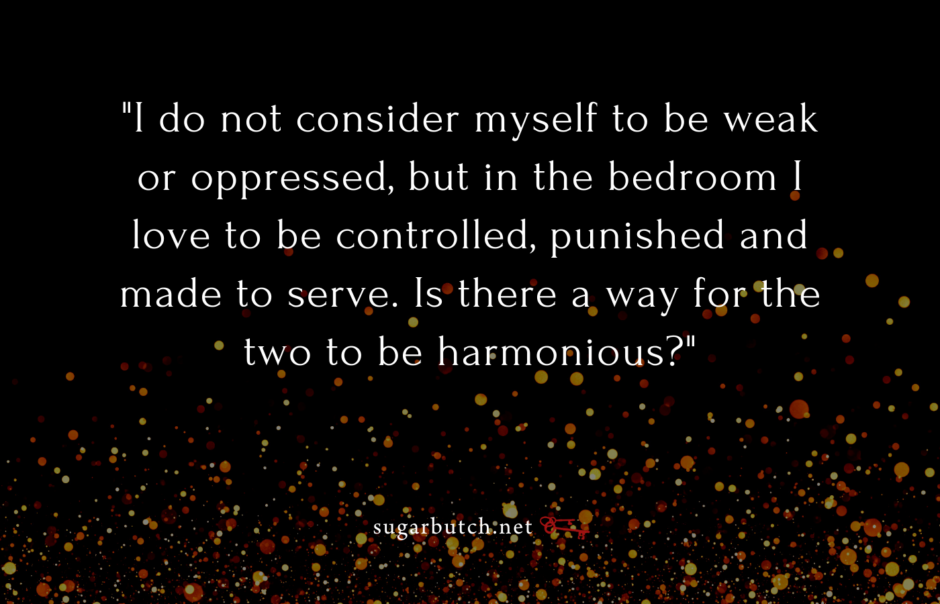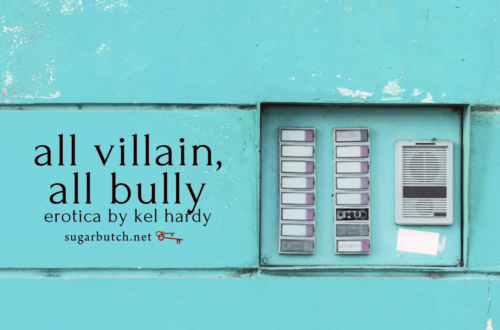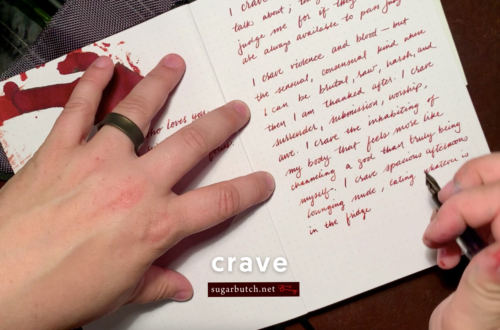Dear Mr. Sexsmith,
I am a strong, opinionated, sometimes bossy, lesbian. I have a huge passion for the empowerment, education and advocacy of women. I volunteer as a sexual assault advocate and have been involved as a Planned Parenthood educator. I am very vocal about breaking the cycle of female oppression in our culture.
I feel a personal conflict, as I also identify as femme and am very much a bottom in the bedroom. I like to be dominated and controlled in sexual play and I very much get off on fantasies that boarder on roughness and non-consent. I guess my struggle lies in the dichotomy between my feminist beliefs and my bedroom preferences. I do not consider myself to be a weak or oppressed female, but in the bedroom I love to be controlled, punished and made to serve. Is there a way for the two to be harmonious? I fight for women to have power and to stand up for themselves. Can you help me sort this out?
Tara
I hear you.
I too have come up within the lesbian feminist movements (and in their wakes) with a strong passion for smashing the patriarchy and a vehement dedication to working on less pain for the various gender minorities in the world. And I too like to do dirty, “perverted,” un-politically correct things in my erotic life. I struggle with reconciling my own feminist beliefs with my desire for sadism and wanting to physically cause “pain,” and with my masculinity and dominance and the ways that both masculinity and dominance are seen as corrupted ways of having power in some feminist’s views. I was asked just this morning about my consumption of porn, and my candid talk about how porn is fun and can be useful and good and valuable, and how I reconcile that with feminism. And, oh yeah, I forget that’s a part of that feminist reconciliation process too.
And all of these took a long time, and were long processes.
I have had lots of judgment about sadism, masculinity, dominance, and porn in the past. Some of it was a reaction formation, at least in a minor way, I think. I had reactions and judgment both about other people’s visible execution of these things, and the tendencies in myself—my own desires. I struggled to reconcile those tendencies and how they went with my feminist commitments to gender liberation and my sensitivities to surviving abuse and being in a rape culture.
I think it absolutely is possible to reconcile, to sort this out.
Here’s some of the ideas that I kicked around—for years and years, with trusted friends, at kink conferences, with lovers. It was not an immediate process. It required adopting a new kind of feminism, I think—a BDSM- and kink-friendly feminism that is rooted in agency and consent, and that understands the difference between play and abuse.
Consider these things:
1. Bottoming, service, and surrendering control, comes from a place of great strength and power.
People have the idea in their heads that bottoming is weak, but I think that is not true at all. Bottoming is incredibly powerful. Being able to know where your own boundaries are, hold yourself safe, be able to speak up for your own needs, ask for what you want, and negotiate trust with a person who is going to assist your body and self on a journey takes a lot of skill and sovereignty. People who do it well have an extensive amount of intelligence, self-worth, and self-knowledge.
It absolutely is making yourself vulnerable. But vulnerability is not about weakness—again, it comes from a place of great strength.
The notion that bottoming, receiving sensation, and submitting to someone else’s desires is weak comes from a twisted version of what those things really are, versions that show only the completely non-consensual and abusive sides of these experiences. But when done consensually, the gift that is bottoming to another is precious and strong. It’s amazing to serve someone else; we serve community, family, friends, and other valuable relationships all the time. We give our power or authority, or cede our control, away intentionally in order to empower others in a variety of contexts, and we can get great pleasure from doing so. And when we find someone worthy of our trust such that we will put our body into their hands for intense sensation, cathartic release, and the deep pleasure of being in the present moment with whatever is happening … how does that not come from a place of power?
The difference, in my opinion, between it coming from power and strength or from oppression comes down to some simple traditional feminist concepts.
2. Consent makes all the difference. All of it.
When done within a framework of consent, I believe it is possible for just about anything to be empowering.
Consent changes experiences completely. In the activist cultures around female oppression, we often talk about consent in a “no means no” way, and stress the value of enthusiastic consent and the “just because they didn’t say no doesn’t mean there was consent!”
But I think an incredibly important piece of examining the feminist concept of consent is also that YES MEANS YES, and that the consent itself is what makes the act possible or okay.
Let me give you an example: I like playing with Daddy/girl and Daddy/boy role play in my sex life. I know that is something kind of extreme to some people, and many people misinterpret it as incest fantasies, which it is and it isn’t (more on that another time). Sometimes I hear people say things like, “But what if you/I/someone crosses the line with an actual young person!”
But for me, that would not happen.
I do not have a fetish for sleeping with and playing roughly with people under eighteen. I have a fetish for sleeping with and playing roughly with adults who adopt a younger persona (usually temporarily) with enthusiastic consent. It’s not about actual incest or actual under-18 youths. No no no no no. It’s about adults tapping in to other parts of ourselves, to open up new experiences.
The consent is actually an essential part of that fetish.
And likewise, I would guess that for you, Tara, you do not have a fetish for a scenario where you are forced to serve against your will, when you were thrown around aggressively and had your body played with when you didn’t want it. Fuck no! But what you do want is within a safe, negotiated relationship, to be “forced” to serve, to play with giving over your will entirely, to be punished for doing something “wrong,” to be used for someone else’s pleasure.
There is a huge, huge difference between the actual thing and some sort of play consensual version of the thing.
3. BDSM—and being punished, controlled, and made to serve—are completely different from abuse and oppression.
And consent is a key piece of that, yes, but there are a lot of other specific, clear, and measurable differences, too.
Read the “BDSM is Not Abuse” list released by the Lesbian Sex Mafia, one of the oldest women’s BDSM groups in the country, based in New York City. I think it articulates things very well:
The Difference Between BDSM and Abuse
SM: An SM scene is a controlled situation.
ABUSE: Abuse is an out-of-control situation.
SM: Negotiation occurs before an SM scene to determine what will and will not happen in that scene.
ABUSE: One person determines what will happen.
SM: Knowledgeable consent is given to the scene by all parties.
ABUSE: No consent is asked for or given.
SM: The “bottom” has a safeword that allows them to stop the scene at any time should they need to for physical or emotional reasons.
ABUSE: The person being abused cannot stop what is happening.
SM: Everyone involved in an SM scene is concerned about the needs, desires and limits of others.
ABUSE: No concern is given to the needs, desires and limits of the abused person.
SM: The people in an SM scene are careful to be sure that they are not impaired by alcohol or drug use during the scene.
ABUSE: Alcohol or drugs are often used before an episode of abuse.
SM: After an SM scene, the people involved feel good.
ABUSE: After an episode of abuse, the people involved feel bad.
Because they are so different, I sometimes think the hyper-articulation of different language is important. It’s one of the reasons that people sometimes use the phrase “consensual non-consent” instead of “rape play,” for example.
The difference between BDSM and abuse goes back to consent, yes; but it goes back to all sorts of other things, too. Like trust, and skill, and agency.
4. Trust in your own agency. Trust in your own experience.
If you negotiate with a lover to get what you want, have an experience, and then everybody feels good after … as long as the experience is “doing no harm” in the world, then I say FUCKING GO FOR IT.
Have some play. Have some ecstasy. Have some screaming release. Have a big bold messy weird experience that maybe other people would judge but it just felt so goddamn good for your body and your mind and your emotions and everything sings a little brighter the next day.
You get to say what happens to your body. You get to have your own experience, and then decide if that was pleasurable or not, enjoyable or not, and whether you’d want to do it again, with this person or with a different person or in a new way or not at all. You get to have your experience of a non-ordinary thing and then, if you feel like fuck yes that was amazing! More more more please! then you can trust that that is real and true. Agency is trusting the answer that you come up with, authentically, when you ask yourself: Does it feel good or bad? Am I left with icky residue or release and joy? Do I feel closer to my play partner, or farther away?
Of course, not every BDSM scene is that easy to evaluate—but some of them just are. Start there. Start with the ones that are easy to tell. Start with trusting your own consent, and agency, and your own deepest experience of what you like or don’t like.
If it matters to you that other people do sometimes see these things you want as contradictory, seek out feminist kink communities. They do exist! This was a topic that came up in the Submissive Playground ecourse quite frequently, actually, and we had a lot of lively discussions about the feminist reconciliation process.
I actually have a dozen more notes about things to say around this process of reconciliation, but this is already more than 2,000 words, so I’m going to call it good for now. Feel free to ask more about specific things in the comments and I’ll do my best to reply!
I hope that gives you lots of places to start. If you’re still stuck, remember, I do one-on-one coaching sessions, and I would be very happy to help you with resources, experiments, ideas, support, or just talking in depth through this reconciliation process. Contact me for more information and pricing.
Got a question for Mr. Sexsmith? Ask it here!
Comment Zen …
Readers, do you relate to Tara’s question?
If you do, would you share your own story about your relationship to feminism and kink? Did you reconcile the two? What was the process like? Slow, fast, hard, simple? What kind of resources helped you on your journey? Books? Anything to recommend for others who are going through this? Do you have any recommendations for feminist kink Fetlife groups?
Leave your story anonymously if you like; your email address will not be published, and if you don’t want your usual “gravitar” picture of you to show up, just type “+sugarbutch” in your email address (like mrsexsmith+sugarbutch@gmail.com) and I’ll know you want to be anonymous.





What a timely article. I’m a survivor of abuse and
I’m exploring BDSM. I think you’re right that it
takes strength to be a bottom. At it’s heart BDSM
is about the power exchange and I think
that’s what I need to remember. I’m not committing
an act of self harm by engaging in this, I’m being
my genuine self. Thank you for the positive
thoughts.
Thanks Kerri. I agree, that it’s an exchange and not just one way is important.
You didn’t quite say this, but your comment made me think of one of the bullet points in my notes for this article that I didn’t finish, which was:
I also think that it’s not necessarily inherently “good for you” or “bad for you,” but that someone’s relationship to it is what makes it a tool they use for value or for harm. Ya know? Like chocolate ice cream can be incredibly awesome, full of connection with friends and fun and self-care, or it can be bad if that’s the only thing you eat all day every day for months. Not so nutritious. So it’s not the thing, it’s the way we use it. And I definitely have heard people talk about the ways they have used BDSM to fuel their bad habits rather than breaking into new ways of being.
I absolutely relate to the question, and I know it has been asked many times in many sites, but that’s because it is still nagging at us. At some level, I guess this is a good thing: it shows alertness, that out antennae are up. On the other hand, we don’t want to lose all pleasure through an unnecessary burden of guilt.
Also, as a bi woman, you should see the ride bottoming for straight men takes you on, especially when the roles you want to play out are exactly the same ones that exist in my traditional culture- all the tricks and coy plays that you just know where created as survival mechanism in a setting where they were the only resource available to women. But it in the end, I think we can’t repeat enough what Sinclair said: Consent does make all the difference and you absolutely need to trust in your own agency.
Personally, I didn’t even want to play in this way UNTIL in I explicitly identified as feminist. I think that sometimes, when you trust in your own agency and you feel that you want to go for that play and that ecstasy with a specific person it is exactly because you know that this is someone you are safe with, who can be trusted to know what pain and submission means, and especially what it doesn’t mean…
I would be really curious though to hear about how other people handle this, especially those who are in some kind of full-time arrangement, because for me, the fact that there is defined play-time, really helps.
This might sound simplistic, but it’s empowering to have the freedom to choose, and embrace whatever personal choice, regardless of perceived role, is the goal in my mind. If fantasy play is limited by a societal effort, then the effort isn’t enhancing ones’ abilities.
So next time the thought come to mind to question if this choice is in accord with philosophy, recognize that the bigger question is if the philosophy intends to enable choice, and if so, then exercising that choice is invaluable in support!
I’m a straight female top, so feel free to ignore this comment if it’s not relevant.
I think asking for your sexual needs to be met is standing up for yourself, and I think your personal power is what makes your decision to submit meaningful. As a top, I can only enjoy a scene if I know my partner can tell me to stop right now and get out if he needs to. What does it for me is someone who can say no choosing not to.
I think that’s an excellent point, thank you! Completely agree that “asking for your sexual needs to be met is standing up for yourself.” It sounds like there’s still a snag (for Tara) about whether it’s okay to have those sexual needs in the first place, so that’s another piece of the puzzle of undoing shame and coming into a kink-positive mindset.
I love this conversation as it’s something that’s only recently surfaced for me. After sharing and enjoying playing with roles and erotic power (or at least I thought it was erotic power) my claim to feminism was questioned by my partner because of the submissive roles I had explored with her. Taking on roles that give up power to the other person is, as Sinclair points out, something that requires a huge amount of trust so that I can reach into the corners of myself and give them up. After this conversation I felt bruised and have since retreated from those roles. As I examine my reaction I think I feel that extent of my submission was not taken seriously and as such not honoured in the way it should be. Before the conversation it would not occur to me to think that she would have viewed me in that way. My feminism has never been questioned by anyone as it is such an obvious part if who I am and how I live. I look back and wonder if my partner was not playing with erotic power but just power. For me there is a subtle but very real difference. It’s painful for me to think back on as it’s like a dint to my pride, question of my very core, so I can’t quite put my finger on it. Either way it’s put me off going there to that extent until I can somehow know that the person I am playing this with also recognises the strength in my submission and knows the difference between erotic power and just ego power. I’m not sure if much of this makes sense… I’ve a feeling I’ve gone a bit off topic…
It makes a lot of sense to me. I had a recent, very hot, relationship with someone who topped me in ways that felt really dangerous and exciting at the time, but I realized later were actually playing around with power in a way that didn’t end up being emotionally safe for me, because they had deeper issues around power that extended beyond sex/kink and into relating. I wouldn’t have necessary described it as “not playing with erotic power but just ego power”, but that phrasing totally resonates. I have also been with a number of tops who played in earth-shattering, hot, dangerous in the push-you-to-your-limits-way but not the trampling-emotional-boundaries way, while never having an issue around ego power. (And I am lucky to be in a relationship with someone like that now — brutal and perverse and controlling in the erotic power sense, kind and emotionally mature and deeply consent-based in the ego realm.)
In most cases my instinct is to be sexually submissive, and I’m a longtime cheerleader for smart, independent feminists who like to be held down and have their hair pulled. (Pretty much everyone here has said it way more poetically and artfully than I can- ;) ) However, I have been in situations where I surprised myself with a rather enthusiastic response to being dominant. It’s something I find fun and challenging and very interesting, but ultimately not as sexually satisfying. Perhaps that will change with some new partner sometime and I’ll find I’m a true “switch.” I will put in my two cents agreeing with stabbity up there though- I can only “let myself go” with spanking or punishing or otherwise dominating if I REALLY know my sub is all in with the safe word and feels totally safe and in control. If I have an inkling that they’re not, then I get worried I might actually hurt somebody, and I can’t follow through. I guess as someone who’s used to taking that bottom role, I really want to be sure that someone bottoming to me is every bit as sure and confident about their limits and communicative as I am so we can all rest assured there won’t be any misunderstandings or injuries (physical or otherwise.)
Wonderful post, really thoughtful read. Plenty to ponder upon :) x
I’m citing this article in an annotated bibliography I’m composing for my 401 Feminist Theories class project on reconciling feminism with BDSM. I find myself challenged and frustrated when reading Dworkin or articles on radfemhub who say that women who engage in BDSM are conforming to the male-dominated system of oppression. Or implying (or flat out stating) that women who want to be submissive are trying to create agency (as opposed to having it), but then say that they don’t blame the women for it. I, personally, find it insulting that they think that as a woman, I’m too blind/ignorant (stupid wouldn’t be a stretch) to consider my own desires mine.
Anyway, thank you for writing this. :) More of this, please!!